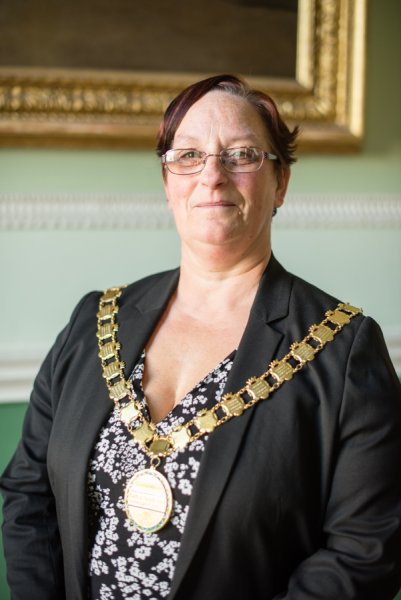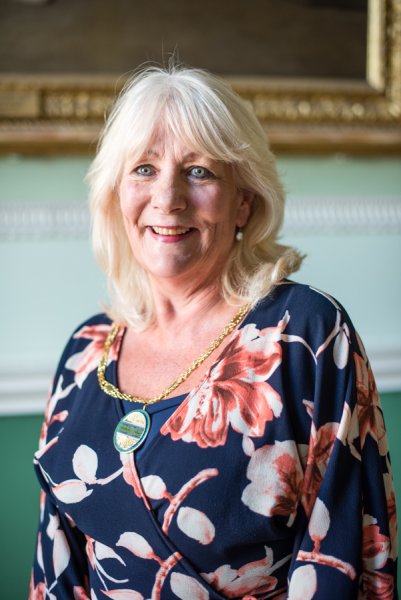Role of the Chair of the Council
Since the council services are being streamlined and re-structured to produce a more effective and efficient service to the community, the role of the Chair has changed.
The main focus is on the core activities which define the nature and role of the office:
Chairing Council meetings
Leading Citizenship Ceremonies
Chairing Parish Liaison meetings
Sharing commemorative events, such as Remembrance Sunday, supporting our Armed Forces Week, and assisting veterans through the ‘military covenant’
Celebrating community landmark events
Welcoming royal visitors, members of the government and civic dignitaries
These categories will normally be definitive, but in exceptional circumstances support may be possible. If you have an event that meets one of the criteria outlined above, please contact the Chair's Office at Chairs_Office@BATHNES.GOV.UK and we will review any requests we receive.
Unfortunately it is not possible for the Chair to continue fund-raising for ‘the Chair’s charities’ but the Community Awards will continue. It is with regret that receptions and exhibitions have come to an end.
It should be noted that while the Chair will continue their duties as a ward councillor, hold surgeries for residents and so on, the position of Chair is strictly politically neutral, and the Chair will not be signing any petitions or joining any public campaigns.
Community Awards
The Awards recognise volunteers, community leaders, community organisations, carers and local businesses and highlights the positive impact they make on others and the wider community.
The Awards are organised annually in partnership with the Volunteer Centre Bath and beyond; social housing provider Curo; the Student Community Partnership, involving the University of Bath and Bath Spa University students unions; HCRG Care Group and The Bath and North East Somerset, Swindon, and Wiltshire Integrated Care Board.
Cllr Sarah Moore, Chair of the Council

Sarah was elected to represent the ward of Twerton in 2019 for the Liberal Democrats and became the Member Advocate for Accessibility in 2021.
Sarah was born in Fairfield Park, Bath and educated in local schools in Larkhall, and has lived in Twerton for over 20 years. Sarah is married with 2 children and is a Finance Administrator for a computer software company where she has worked ongoing for over 30 years.
Sarah has been a strong campaigner against school closures, she campaigned to get additional parking for residents and she also secured funding to get Kelston View resurfaced, which has led to her continuing to actively campaign to get more roads and pavements around Twerton resurfaced.
Sarah co-founded the Twerton & Whiteway Wombles litter pick group; she has organised the Community Speedwatch group and is a governor at Twerton Infant School.
Her key priorities are Accessibility, Education and Housing, she is keen to make sure every child is given fair and equal access to well-funded education, get more family homes for local residents and would like to see the whole area fully accessible for all.
She uses her hobby of knitting to raise money for various local charities and provide reading aids to local schools and nurseries.
Cllr Karen Walker, Vice Chair of the Council

Karen was first elected as an Independent Councillor for Peasedown in May 2015.
During her tenure on the council she has
2017/18 – Served as Vice-Chair of B&NES Council
2018/19 – Served as Chair of B&NES Council
2019 - 2023 – Served as Chair of the Climate Emergency & Sustainability PDS Panel
2019 – 2023 – Served as Leader of the Independent Group
Re-elected again in 2023, Karen now sits on the Children & Adults Health & Wellbeing PDS Panel. She also sits on the Avon Fire Authority.
Karen is a Trustee of the Peasedown Community Trust, which runs several projects in Peasedown St John – including the Community Library, Community Orchard, the Dementia Friendly Peasedown initiative and the popular Party in the Park Community Festival.
Karen is very passionate about the community in Peasedown and serving her residents well.
The Lord-Lieutenant of Somerset
His Majesty's Lord-Lieutenant of a county is an Honorary Officer appointed by the King on the advice of the Pirme Minister. They are the permanent representative of the Crown in that county and normally serve until retirement at between 70 and 75 years of age.
Somerset Lieutenancy covers the historic county of Somerset (the areas administered by Bath & North East Somerset, North Somerset, and Somerset County Councils). The total population of this area at the last census was 981,700.
The Lord-Lieutenant of Somerset is Mr Mohammed Saddiq.
HM Lord-Lieutenant of Somerset
Lieutenancy Office
County Hall
Taunton
Somerset
TA1 4DY
The office dates from the reign of Henry VIII, and the Lord-Lieutenant was originally responsible for the maintenance of order and for local defence.
Today, the responsibilities of the Lord Lieutenant include:
- All aspects of visits by members of the Royal Family, and escorting Royal Visitors
- Presentation of awards and medals on behalf of The King
- Representing The King at a variety of events
- Liaison with local units of the Royal Navy, Army and Royal Air Force, and with the reserve forces and cadets
- Participation in civic and voluntary activity within the Lieutenancy
- Advising on honours nominations
- Chairmanship of the Advisory Committee which recommends the appointment of magistrates to the Lord Chancellor
On ceremonial occasions, Lord-Lieutenants wear uniform, or a special badge of office.
The Lord-Lieutenant is supported by a Vice Lord-Lieutenant and by Deputy Lieutenants, who they appoint from those people who have rendered particular service to the county in a variety of ways, the number of Deputies depending on the size of the population. There are normally between 30 and 40 Deputy Lieutenants.
The High Sheriff of Somerset
The High Sheriff of Somerset is Robert Drewitt Esq.
Hill View House
Bishop Sutton
Bristol
Somerset
BS39 5UJ
Email: robertdrewett@highsheriffsomerset.org.uk
You can also find more information on The High Sheriff of Somerset website.
The Office of High Sheriff is at least 1,000 years old, having its roots in Saxon times, before the Norman Conquest. It is the oldest continuous secular office under the Crown. Originally, the office held many of the powers now vested in HM Lord-Lieutenants, High Court judges, magistrates, local authorities, coroners and even the Inland Revenue.
The Office of High Sheriff remained first in precedence in the counties until the reign of Edward VII, when an Order in Council in 1908 gave the Lord-Lieutenants the prime office under the Crown as the sovereign's personal representative. Lord-Lieutenants were created in 1547 for military duties in the shires. The High Sheriff remains the sovereign's representative in the county for all matters relating to the judiciary and the maintenance of law and order.
Functions of the office
High Sheriffs are responsible in the counties of England and Wales for duties conferred by the Crown through warrant from the Privy Council, including:
- attendance at Royal visits to the county
- the well-being and protection of His Majesty's High Court judges when on circuit in the county and attending them in court during legal terms
- acting as the Returning Officer for Parliamentary elections in county constituencies
- responsibilities for the proclamation of the accession of a new sovereign
- the maintenance of the loyalty of subjects to the Crown
- in Somerset, the leading role in Somerset Crimebeat
Nominations for High Sheriff
Nominations to the office of High Sheriff are dealt with through the presiding Judge of the Circuit and the Privy Council, for consideration by the Sovereign in Council. The annual nominations of three prospective High Sheriffs for each county are made in a meeting of the Lords of the Council in the King's Bench Division of the High Court of Justice, presided over by the Lord Chief Justice on 12 November each year. Subsequently, the selection of new High Sheriffs is made annually in a meeting of the Privy Council by the Sovereign, when the custom of 'pricking' the appointee's name with a bodkin is perpetuated.
The Sheriff's Year
The High Sheriff takes up appointment upon making a sworn declaration in terms dictated by the Sheriffs Act 1887. The appointment is for one year only, except in the event of something untoward happening to the High Sheriff's expected successor, in which case a High Sheriff must remain in office until a successor is appointed.
High Sheriffs are now encouraged by the Shrievalty Association of England and Wales to undertake duties to improve and sustain the morale of the personnel of voluntary and statutory bodies engaged in the maintenance and extension of law and order, and the entire criminal justice system.
It is an independent, non-political office which enables the holder to bring together a wide variety of individuals and office holders for the good of the community they serve. In recent years, High Sheriffs in many parts of England and Wales have been particularly active in the field of crime reduction and the development of an anti-crime culture, particularly among young people.
The High Sheriff receives no pay or expenses.
